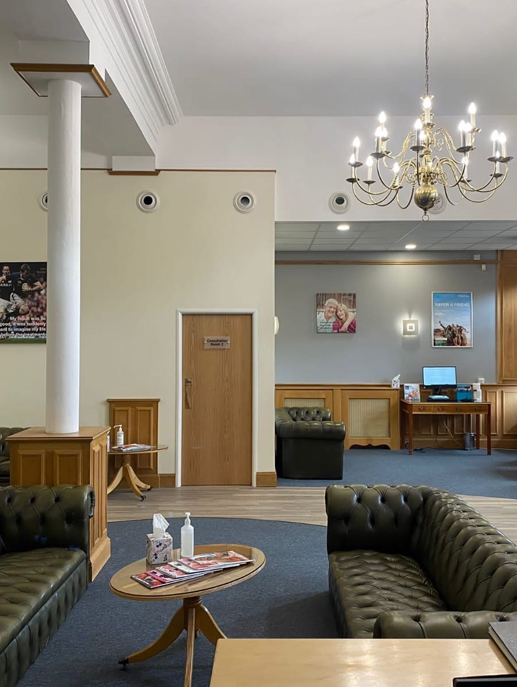Reach Us
Book An Appointment
Please fill out the form below to connect with one of our advisors and start your booking process. They will call to discuss your visual requirements and finalise the appointment booking.

Cataracts form when the eye’s natural lens becomes cloudy as a result of eye tissues breaking down and proteins clumping together. They impair vision and can only be rectified with cataracts treatment. Cataract surgery involves removing your eye's natural, clouded lens and replacing it with an artificial one. If you need to wear glasses, a new lens with the correct focusing power is implanted so that glasses may not be required. This includes improvement in both reading and distance vision when a multifocal lens is used.
There are several different types of cataracts, categorized based on their location within the eye or the cause of their development. Cataracts can be treated with surgery, which involves removing the cloudy lens and replacing it with an artificial intraocular lens (IOL). The type of cataract and the individual's overall eye health will determine the most suitable treatment approach.
Cataract surgery is a common and highly successful procedure that involves several key steps. It begins with the administration of local anesthesia to numb the eye. A small incision is made in the cornea, allowing the surgeon to remove the cloudy natural lens affected by the cataract using ultrasound or laser technology. An artificial intraocular lens (IOL) is then implanted to replace the removed lens. The incision is closed, and most patients experience improved vision within a day or two, making the surgery a minimally invasive and highly effective solution for cataracts.
There are many types of lenses which suit different people, depending on your lifestyle and prescription. At Optimax, we offer a range of monofocal, multifocal or trifocal lenses. These allow you to have sharp vision for multiple distances, eliminating the need for reading glasses while removing your cataracts at the same time. During your consultation, the best lenses and your options are explained to you. Some complex lenses can be custom-made for you at an additional cost.
At Optimax we pride ourselves on taking excellent care of our patients, which is why you’ll have a number of appointments after the procedure until you are discharged with satisfactory results. A day or two after your cataract surgery, you will be seen at your consultation clinic, with another visit to follow a week or so later. We’ll also schedule in a third meeting around 4-6 weeks on from the operation, with a fourth to take place 3-6 months post-surgery, where you’ll be discharged if the results have proven satisfactory.

We are recognised providers of cataract surgery for several Private Health Insurance Companies. Please let us know as soon as possible if you think this may be relevant to you and always check with your insurance provider before arranging any treatment.
Below you’ll find answers to some of the most common questions we receive. We are constantly keeping track of what information our patients are interested in and aim to provide it in the simplest form possible. If you cannot find the answers you are looking for within this section, please don't hesitate to get in touch with one of our advisors who are on standby to discuss your visual requirements and respond to your queries.
Cataract surgery is performed by the NHS more often than any other procedure. According to the National Ophthalmology Database, approximately 434,000 operations were undertaken in England and Wales in 2017-18, and the NHS describes the risk of serious complications arising from cataracts treatment as “very low”. The risk of infection occurs in 1 in 1,000 patients – or 0.1% – and you will be meticulously checked at all of your aftercare appointments. The most common after-effect is Posterior Capsular Opacification, which usually manifests itself as clouded vision and is easily treated.
We’re proud to report that 95% of people who come to Optimax for cataracts treatment achieve the minimum driving standard or better.
A successful cataract removal procedure should leave you with the ability to see things clearly and in focus. You should also be able to differentiate between colours and not see as much glare when looking into bright lights.
No. We will apply anaesthetic eyedrops prior to your cataract surgery procedure. Your surgery will be carried out using ultrasound, rather than a laser. Soundwaves break up the cataract, which is then removed from your eye.
The operation itself usually lasts approximately 10 minutes. However, please be aware that you may be in the theatre for around 30 minutes, while you might be at the clinic for up to four hours on the day. Your visit will include preparation time, a chat with the surgeon and discussions with a patient advisor, who will run you through your post-surgery care and medication.
Cataract surgery is permanent, although we do offer laser top up treatment and piggyback lenses at an additional cost if your vision requires any fine tuning. We aim to ensure our patients become as glasses-free as possible, although some people with monofocal lenses may still need spectacles for reading.
We perform bilateral procedures (both eyes treated on the same day, one after the other) but this will need to be discussed with your treating surgeon. If you prefer, you can also have your eyes treated separately, a week apart, diary permitting.
Yes, patients who opt for a basic cataract treatment will require glasses after surgery. However, our objective is to allow our customers to see clearly without the use of glasses on a permanent basis, which is done by inserting an artificial multifocal lens. You can read about the different types of lenses available at Optimax here.
Most patients who undergo cataracts treatment show major improvements in their vision within the first 24 hours. However, it will be up to your optometrist to confirm when driving standards have been met and you can get behind the wheel again.
Please fill out the form below to connect with one of our advisors and start your booking process. They will call to discuss your visual requirements and finalise the appointment booking.